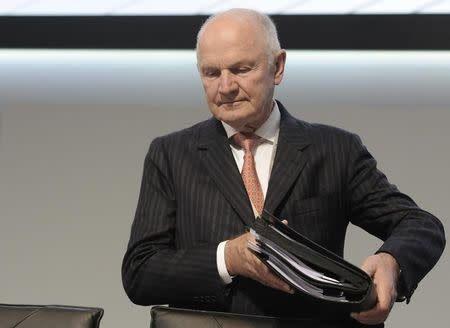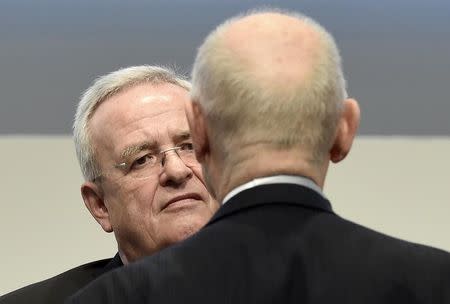Ferdinand Piech resigns, ending an era at Volkswagen
By Jan Schwartz and Georgina Prodhan HAMBURG/FRANKFURT (Reuters) - Ferdinand Piech, a towering figure at Volkswagen for more than two decades, resigned as its chairman on Saturday after losing a showdown he had provoked with Chief Executive Martin Winterkorn, ending an era at the iconic German carmaker. Piech, the 78-year-old grandson of the inventor of the Volkswagen Beetle Ferdinand Porsche, had previously seen off other executives who crossed him, including his own hand-picked successor as CEO, Bernd Pischetsrieder. But this time he was unexpectedly isolated in a five-to-one vote of Volkswagen's steering committee last week, as labor representatives, the state of Lower Saxony and even his own cousin Wolfgang Porsche stood firmly behind Winterkorn. "The members of the steering committee came to a consensus that, in the light of the past weeks, the mutual trust necessary for successful cooperation was no longer there," the six-member panel said in a statement after another meeting on Saturday. Berthold Huber, the senior trade unionist who will take over until a new chairman is elected, said: "The uncertainty had to be ended today. The steering committee was and is conscious of its responsibility to Volkswagen and its many thousand staff." Two sources with knowledge of the matter said Piech had resigned without forcing a vote of the committee at its second crisis gathering in 10 days. Piech resigned with immediate effect from all his roles at Volkswagen including as an ordinary supervisory board member, as did his second wife Ursula, a former nanny who joined the supervisory board in 2012. "Piech's departure represents a seismic shift in Volkswagen's power structure, and could foretell drastic changes in how one of the world's largest automakers operates," wrote Karl Brauer, senior analyst at analysis firm Kelley Blue Book. "VW has kept pace with General Motors and Toyota's <7203.T> growth in recent years, making it a very tight three-way race for the title of largest global automaker, but VW's struggles in markets like the U.S. and Brazil, along with lower profit margins versus GM and Toyota, shows there's still much work to be done." The leadership row burst into the open this month when news weekly Der Spiegel quoted family patriarch Piech as saying he had "distanced" himself from CEO Winterkorn. The comment came at a time when VW is cutting billions of euros of costs and revamping structures, having struggled with chronic underperformance in the United States and declining profitability at its core autos division. WINTERKORN'S CHANCES Winterkorn's current contract expires at the end of 2016, but last week's agreement to back him included a commitment to discuss an extension. Piech's departure increases the chances of Winterkorn succeeding him as chairman - something that Piech wanted to prevent at all costs, Volkswagen insiders believe. That would leave the way open for Porsche CEO and VW management board member Matthias Mueller, already seen as a favorite to succeed Winterkorn, to take over. "What changes will we see to fill the void left by Piech? Do we have Winterkorn stepping up to chairman and Matthias Mueller as CEO? That could happen," said analyst Stuart Pearson of Exane BNP Paribas. But Piech's influence may still make itself felt through the 51-percent voting rights the Piech-Porsche clan owns in Volkswagen, now represented on the supervisory board by Wolfgang Porsche, if family ties withstand the recent turmoil. While he may have failed to unseat the CEO, Piech's departure is unlikely to end the increased scrutiny the public duel has drawn to the group's strategic shortcomings. Volkswagen's management may still have to address the criticisms Piech raised, which include the failure to engineer a low-cost car. When Piech became CEO of VW in 1993, the company was losing money, prompting him to cut pay and working hours at German plants and streamline production During his nine-year tenure, he turned a loss equivalent to 1 billion euros ($1.09 billion) into a 2.6 billion euro profit while spearheading VW's expansion to a 12-brand entity that makes everything from fuel-efficient city cars to 40-tonne trucks. Exane BNP Paribas' Pearson said Piech's abrupt resignation would come as a shock to investors despite the recent drama. "Those seeing the glass half full may view this as an opportunity to improve corporate governance at VW," he said. "However, first VW will need to demonstrate that its operating performance is on track and not the cause of Piech and Winterkorn's discord." (Additional reporting by Laurence Frost, Maria Sheahan and Ilona Wissenbach; Editing by Mark Trevelyan)

 Yahoo News
Yahoo News 


